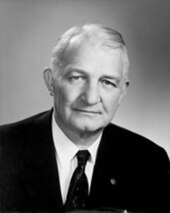m (Remove some templates and interwiki links, delink non military terms and cleanup) |
m (→External links: Remove some templates and interwiki links, delink non military terms and cleanup) |
||
| Line 66: | Line 66: | ||
{{SenPublic WorksCommitteeChairmen}} |
{{SenPublic WorksCommitteeChairmen}} |
||
| + | |||
| ⚫ | |||
{{DEFAULTSORT:Revercomb, William Chapman}} |
{{DEFAULTSORT:Revercomb, William Chapman}} |
||
| Line 80: | Line 82: | ||
[[Category:People from Covington, Virginia]] |
[[Category:People from Covington, Virginia]] |
||
[[Category:20th-century American politicians]] |
[[Category:20th-century American politicians]] |
||
| ⚫ | |||
Revision as of 21:14, 12 November 2017
| Chapman Revercomb | |
|---|---|

| |
| United States Senator from West Virginia | |
In office January 3, 1943 – January 3, 1949 | |
| Preceded by | Hugh Ike Shott |
| Succeeded by | Matthew M. Neely |
In office November 7, 1956 – January 3, 1959 | |
| Preceded by | William R. Laird, III |
| Succeeded by | Robert Byrd |
| Personal details | |
| Born | William Chapman Revercomb July 20, 1895 Covington, Virginia |
| Died | October 6, 1979 (aged 84) Charleston, West Virginia |
| Political party | Republican |
| Religion | Presbyterianism |
William Chapman Revercomb (July 20, 1895 – October 6, 1979) was an American politician and lawyer in the state of West Virginia. He served two separate terms in the United States Senate.
Life and career
Revercomb was born in Covington, Virginia, the son of Elizabeth Forrer (Chapman) and George Anderson Revercomb. He attended Washington and Lee University before entering the United States Army in World War I where he served as a corporal. Returning from the war, he transferred to the law school at the University of Virginia, graduating in 1919. He practiced law in Covington for few years before moving to Charleston, West Virginia in 1922.
He was elected to the Senate in 1942. There he championed opposition to the foreign and domestic policies of the administration of Harry S. Truman and was a stalwart supporter of civil rights. In 1945, Revercomb was among the seven senators who opposed full United States entry into the United Nations.[1] Revercomb was defeated for re-election in 1948 and for the state's other Senate seat in 1952. In both races, his support of the national Republican party's civil rights policies were major issues.
In 1956, he won a special election to fill the vacancy caused by the death of Harley M. Kilgore, his Democratic opponent in the 1952 election. He re-entered the Senate and served through the end of 1958.
In 1958, he lost to Congressman Robert Byrd in his re-election bid in another racially charged election (Byrd held the seat until his death in 2010, becoming the first U.S. senator to serve uninterrupted for more than 50 years). He then lost the Republican nomination for governor in 1960 and retired from politics. He practiced law in Charleston until his death in 1979.
Revercomb was the last Republican to represent West Virginia in the Senate (his 1956-59 term) until the election of Shelley Moore Capito in 2014 ended a 58- year streak of Democratic Senate victories in the state.
References
- ↑ "UNO Bill Approved By Senate, 65 to 7, With One Change". The New York Times. December 4, 1945. https://www.nytimes.com/learning/general/onthisday/big/1204.html#article. Retrieved December 27, 2016.
External links
- Chapman Revercomb at the Biographical Directory of the United States Congress Retrieved on 2009-5-18
- "Chapman Revercomb". Find a Grave. http://www.findagrave.com/memorial/7619334. Retrieved 2009-05-18.
| <templatestyles src="Hlist/styles.css"></templatestyles><templatestyles src="Module:Navbar/styles.css"></templatestyles>
Template:USCongRep/WV/78 Template:USCongRep/WV/79 Template:USCongRep/WV/80 Template:USCongRep/WV/81 Template:USCongRep/WV/82 Template:USCongRep/WV/83 Template:USCongRep/WV/84 Template:USCongRep/WV/85 |
|---|
Template:SenPublic WorksCommitteeChairmen
The original article can be found at Chapman Revercomb and the edit history here.